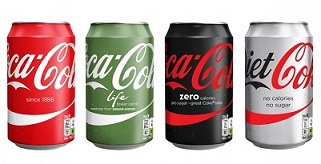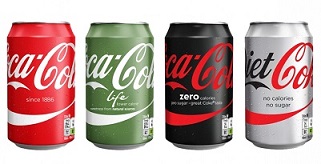
With adherence to “One Brand” idea coupled with excellently crafted design and a perfect balance of flexibility with consistency, the Coca Cola brand sets an outstanding example of modern and fashionable global branding. In the first week of March 2015, Coke revealed a unique marketing strategy with the aim to unite –Coca Cola, Diet Coke, Coke Zero and Coca-Cola Life under a single iconic red brand of Coca Cola. Until now, all four sub-brands had their individual distinct designs and separate marketing strategies targeting towards different sets of audiences, but with this new proposition all these brands will be unified by an ad campaign linking all the packages with a single design. The new marketing approach will be launched in UK and Europe from second week of March, while entire marketing and distribution will be introduced in May 2015.
With the aim to establish Coca Cola as a leading brand, this revolutionary move will bring a fundamental change in its direction and reinforce single brand across the entire range of products. However, the brand design that has already been unveiled is not expected to deliver the required impact of a master brand. Coke concluded that its 30 year model is backdated and the investments that was put into the different sub-brands are not beneficial.
However, the classical error in the campaign is an imbalance between the brand packaging and communication strategy. In simple words, a communication strategy if not synchronized with branding will not create the desired impact. In order to remove confusion and achieve its objective, the Coca Cola needs a single visual individuality. It seems clear that Coke’s key concern is that the adoption of a single brand policy on its packaging can result in loss of recognition for its different sub-brands that consumers are familiar with.
The new marketing plan is a vital change in the direction for brand. The company witnessed a decline in sales followed by the announcement of single brand strategy. Despite a slump in its overall sale by £30 million in 2014, Zero and new Coca-Cola Life indicated signs of growth during the same period.
The new proposed strategy of uniform brand is highly cost effective for the company through rationalization of its advertising. But in order to make the plan successful, the execution of branding and packaging should be done only considering the same strategy.
While Coke Zero and Life can potentially fit under the plan of a master brand but it’s difficult for Diet Coke to make room for itself. Diet Coke has already established itself as a distinct personality over the time frame which might get lost due to its shift to a single brand strategy. The consequence of this strategic move cannot be completely ignored as it might lead to a conflict with Coke zero.
Coca Cola’s transformation into a single master brand is a good idea. If we take into account, the coverage of the campaign to different parts of the world, it represents the second largest worldwide effort in the history of branding. However, this strategic transformation is likely to create confusion rather than enhancements and ultimately results into flavour variants and not distinct proposition. In order to attain success, the essential requirement for a design change is a bigger and broader vision.
With the aim to establish Coca Cola as a leading brand, this revolutionary move will bring a fundamental change in its direction and reinforce single brand across the entire range of products. However, the brand design that has already been unveiled is not expected to deliver the required impact of a master brand. Coke concluded that its 30 year model is backdated and the investments that was put into the different sub-brands are not beneficial.
However, the classical error in the campaign is an imbalance between the brand packaging and communication strategy. In simple words, a communication strategy if not synchronized with branding will not create the desired impact. In order to remove confusion and achieve its objective, the Coca Cola needs a single visual individuality. It seems clear that Coke’s key concern is that the adoption of a single brand policy on its packaging can result in loss of recognition for its different sub-brands that consumers are familiar with.
The new marketing plan is a vital change in the direction for brand. The company witnessed a decline in sales followed by the announcement of single brand strategy. Despite a slump in its overall sale by £30 million in 2014, Zero and new Coca-Cola Life indicated signs of growth during the same period.
The new proposed strategy of uniform brand is highly cost effective for the company through rationalization of its advertising. But in order to make the plan successful, the execution of branding and packaging should be done only considering the same strategy.
While Coke Zero and Life can potentially fit under the plan of a master brand but it’s difficult for Diet Coke to make room for itself. Diet Coke has already established itself as a distinct personality over the time frame which might get lost due to its shift to a single brand strategy. The consequence of this strategic move cannot be completely ignored as it might lead to a conflict with Coke zero.
Coca Cola’s transformation into a single master brand is a good idea. If we take into account, the coverage of the campaign to different parts of the world, it represents the second largest worldwide effort in the history of branding. However, this strategic transformation is likely to create confusion rather than enhancements and ultimately results into flavour variants and not distinct proposition. In order to attain success, the essential requirement for a design change is a bigger and broader vision.


















